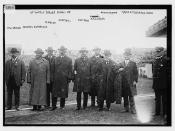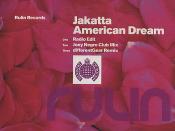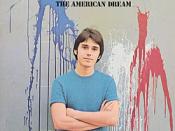David Trask once said, commenting on F. Scott Fitzgerald's Great Gatsby that "The Great Gatsby is about many things, but it is inescapably a general critique of the 'American Dream' and also of the 'agrarian myth' - a powerful demonstration of their invalidity for Americans of Fitzgerald's generation and after." Fitzgerald defiantly breaks down the societal boundaries of the 1920's and creates a new societal example.
Although the country was rooted in the American Dream, or what they thought was the American Dream, Fitzgerald rubs the gilding off of the sides. At a first look into the book it seems as if Fitzgerald appreciates the American dream. He shows a man, James Gatz, who had a dream and followed it to its end. He considers Gatsby's dream so noble that he compares his path with that of Benjamin Franklin's when he shows Gatsby's schedule for greatness, just as Benjamin Franklin had prescribed many years before.
But Jay's American Dream was truly not one of a happy ending. This dream, in terms of Gatsby was a corrupted one. He hadn't become the self made man obtaining his money through capitalistic means, he merely was a bootlegger. He came up with a get rich easy scheme without putting in the hard work. Fitzgerald clearly agreed that part of the "American Dream" is the chase to obtain that dream. Even the so-called benefits of the dream; money, power, and happiness, have been corrupted by Jay's get rich quick scheme. The promise of friends in the American Dream is broken down when as soon as Gatsby is dead, the lights fade, and his so-called friends seemingly dissipate. The happiness Gatsby thinks he has through obtaining the American dream is merely a façade that fades away as we see Gatsby's true character. Clearly, F. Scott Fitzgerald understood that the American Dream, when corrupted, is no longer a dream but rather a facade.
Fitzgerald also shows that the "Agrarian myth" is neither a great option either. He confronts the American Dream with the character of Gatsby's father. His father is disheveled and seemingly in bad condition during the book. One could go as far to say that Mr. Gatz was even a failure working in the Midwest. Wilson also represents the "Agrarian Myth" But he is surrounded by a wife trying to live in an n American Dream world and ends up killing himself and the ultimate representation of the corrupted American Dream.
Although Fitzgerald confronts both the "American Dream" and the "Agrarian Myth" he provides an alternate. He shows Nick Carraway as the ultimate alternative. Picking from both ideals of the American Dream and Agrarian Myth, Nick Carraway becomes the hero of the 1920's. Nick Carraway is in some ways a self made man. He works hard for his tiny flat in West Egg, and is rooted in the ideal of working for a steady income. He also captures the "American Dream" in the sense that he lives in it every day. Nick becomes the Agrarian Farmer in the wilderness of New York. He becomes the new myth or dream. Someone who works hard for their living, but can still live in a moderate world of glitz and glamour. Nick is a more substantial person than Gatsby in that he is rooted in true friends, and spends to what he needs. Nick is also a more substantial character than Wilson, in that he can embrace the world of the American Dream. Nick is essentially the new working class businessman of the 1920's. Fitzgerald defines the new myth of the upper middle class man working to sustain himself.
Fitzgerald clashes with both the Agrarian Myth and the American Dream to create the new upper middle class man of the 1920's. His representation of Gatsby shows that he does not agree with him. Fitzgerald's representation of Wilson also shows that he dislikes the Agrarian Myth. But instead of leaving America with no ideal, and no hero, he creates Nick Carraway, the new hero of the 1920's.


